The book was composed during the period when Potter was also working on The Tale of Squirrel Nutkin and it was inspired by a story she heard about a poor tailor in Gloucestershire in the late 1890s. The work was completed by the end of 1901 and given to Annie Carter Moore’s daughter for Christmas. Potter later revised the work before it was privately printed a year later. John Pritchard was a real life tailor commissioned to make a suit for the town mayor, but when he returned to his shop the suit had been completed except for one buttonhole which had note attached saying ‘No more Twist’. In reality his assistants had completed the work, but Pritchard encouraged the story that fairies had made the suit and the tale became a local legend. Potter was allowed inside a tailor’s shop in Chelsea in order to sketch the interior for authenticity, although she chose to employ poetic licence and altered the tailor’s age from his twenties to a much older, more frail and poor man.
The tailor in The Tale of Gloucester would ensure financial security for himself if he managed to make the suit for the mayor because it would result in acquiring wealthy clients. However the old man becomes ill and believes he will be unable to complete the work and that he will be ruined. Potter alters the story Pritchard propagated about fairies to a tale about the work of mice. ‘No more Twist’ becomes a refrain in the book as Potter continues to focus on the literary devices of rhythm and repetition in her work.
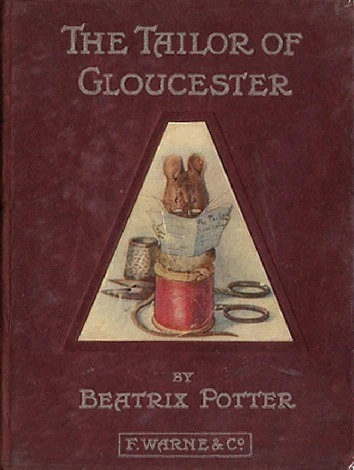
The first edition
THE TAILOR OF
GLOUCESTER

BY
BEATRIX POTTER
Author of “The Tale of Peter Rabbit,” etc
“I’LL BE AT CHARGES FOR A LOOKING-GLASS,
AND ENTERTAIN A SCORE OR TWO OF TAILORS”
Richard III
MY DEAR FREDA,
Because you are fond of fairy-tales, and have been ill, I have made you a story all for yourself — a new one that nobody has read before.
And the queerest thing about it is — that I heard it in Gloucestershire, and that it is true — at least about the tailor, the waistcoat, and the
“No more twist!”
Christmas, 1901
THE TAILOR OF GLOUCESTER
In the time of swords and periwigs and full-skirted coats with flowered lappets — when gentlemen wore ruffles, and gold-laced waistcoats of paduasoy and taffeta — there lived a tailor in Gloucester.
He sat in the window of a little shop in Westgate Street, cross-legged on a table, from morning till dark.
All day long while the light lasted he sewed and snippeted, piecing out his satin and pompadour, and lutestring; stuffs had strange names, and were very expensive in the days of the Tailor of Gloucester.
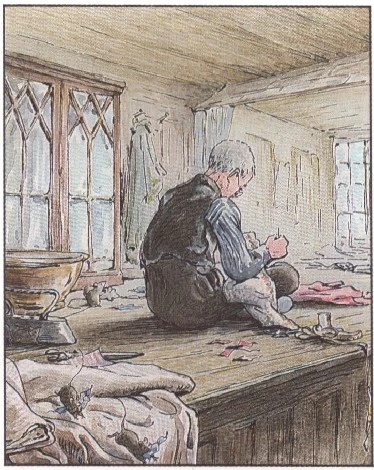
But although he sewed fine silk for his neighbours, he himself was very, very poor — a little old man in spectacles, with a pinched face, old crooked fingers, and a suit of thread-bare clothes.
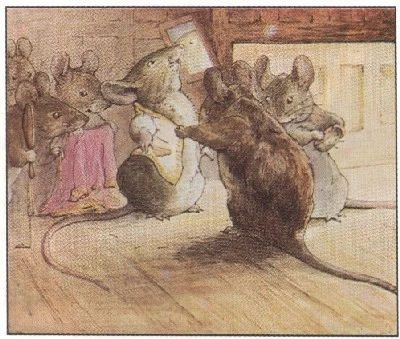
He cut his coats without waste, according to his embroidered cloth; they were very small ends and snippets that lay about upon the table— “Too narrow breadths for nought — except waistcoats for mice,” said the tailor.
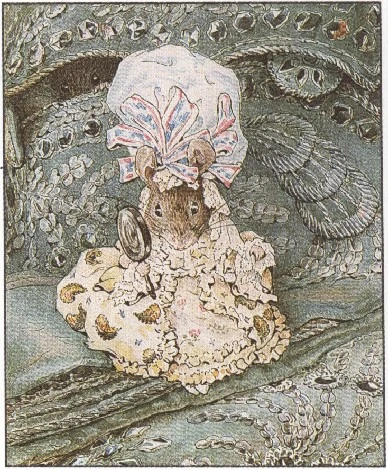
One bitter cold day near Christmastime the tailor began to make a coat — a coat of cherry-coloured corded silk embroidered with pansies and roses, and a cream coloured satin waistcoat — trimmed with gauze and green worsted chenille — for the Mayor of Gloucester.
The tailor worked and worked, and he talked to himself. He measured the silk, and turned it round and round, and trimmed it into shape with his shears; the table was all littered with cherry-coloured snippets.
“No breadth at all, and cut on the cross; it is no breadth at all; tippets for mice and ribbons for mobs! for mice!” said the Tailor of Gloucester.
When the snow-flakes came down against the small leaded window-panes and shut out the light, the tailor had done his day’s work; all the silk and satin lay cut out upon the table.
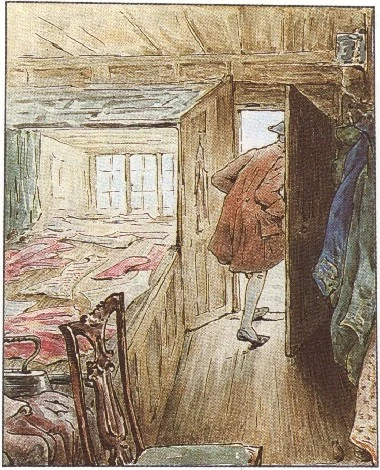
There were twelve pieces for the coat and four pieces for the waistcoat; and there were pocket flaps and cuffs, and buttons all in order. For the lining of the coat there was fine yellow taffeta; and for the button-holes of the waistcoat, there was cherry-coloured twist. And everything was ready to sew together in the morning, all measured and sufficient — except that there was wanting just one single skein of cherry-coloured twisted silk.
The tailor came out of his shop at dark, for he did not sleep there at nights; he fastened the window and locked the door, and took away the key. No one lived there at night but little brown mice, and they run in and out without any keys!
For behind the wooden wainscots of all the old houses in Gloucester, there are little mouse staircases and secret trap-doors; and the mice run from house to house through those long narrow passages; they can run all over the town without going into the streets.
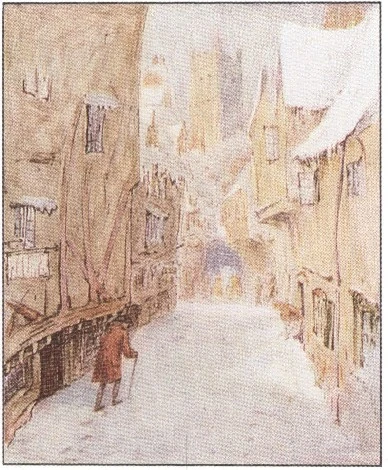
But the tailor came out of his shop, and shuffled home through the snow. He lived quite near by in College Court, next the doorway to College Green; and although it was not a big house, the tailor was so poor he only rented the kitchen.
He lived alone with his cat; it was called Simpkin.
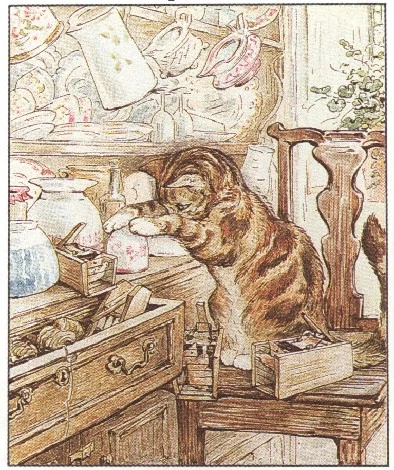
Now all day long while the tailor was out at work, Simpkin kept house by himself; and he also was fond of the mice, though he gave them no satin for coats!
“Miaw?” said the cat when the tailor opened the door. “Miaw?”
The tailor replied— “Simpkin, we shall make our fortune, but I am worn to a ravelling. Take this groat (which is our last fourpence) and Simpkin, take a china pipkin; buy a penn’orth of bread, a penn’orth of milk and a penn’orth of sausages. And oh, Simpkin, with the last penny of our fourpence buy me one penn’orth of cherry-coloured silk. But do not lose the last penny of the fourpence, Simpkin, or I am undone and worn to a thread-paper, for I have NO MORE TWIST.”
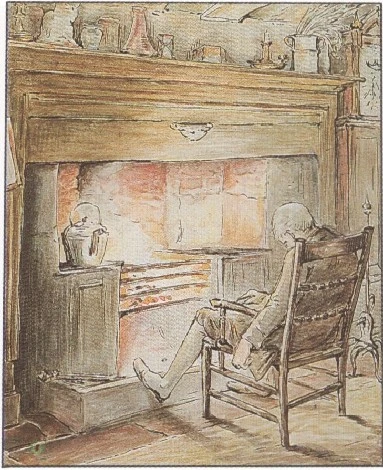
Then Simpkin again said, “Miaw?” and took the groat and the pipkin, and went out into the dark.
The tailor was very tired and beginning to be ill. He sat down by the hearth and talked to himself about that wonderful coat.
“I shall make my fortune — to be cut bias — the Mayor of Gloucester is to be married on Christmas Day in the morning, and he hath ordered a coat and an embroidered waistcoat — to be lined with yellow taffeta — and the taffeta sufficeth; there is no more left over in snippets than will serve to make tippets for mice — — “
Then the tailor started; for suddenly, interrupting him, from the dresser at the other side of the kitchen came a number of little noises —
Tip tap, tip tap, tip tap tip!
“Now what can that be?” said the Tailor of Gloucester, jumping up from his chair. The dresser was covered with crockery and pipkins, willow pattern plates, and tea-cups and mugs.
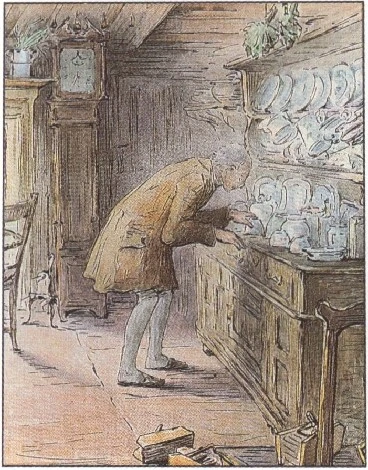
The tailor crossed the kitchen, and stood quite still beside the dresser, listening, and peering through his spectacles. Again from under a tea-cup, came those funny little noises —
Tip tap, tip tap, Tip tap tip!
“This is very peculiar,” said the Tailor of Gloucester; and he lifted up the tea-cup which was upside down.
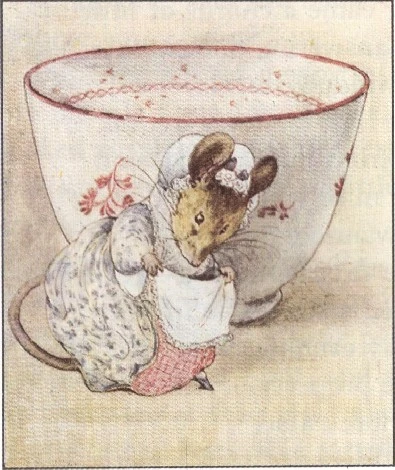
Out stepped a little live lady mouse, and made a curtsey to the tailor! Then she hopped away down off the dresser, and under the wainscot.
The tailor sat down again by the fire, warming his poor cold hands, and mumbling to himself ——
“The waistcoat is cut out from peach-coloured satin — tambour stitch and rose-buds in beautiful floss silk. Was I wise to entrust my last fourpence to Simpkin? One-and-twenty button-holes of cherry-coloured twist!”
But all at once, from the dresser, there came other little noises:
Tip tap, tip tap, tip tap tip!
“This is passing extraordinary!” said the Tailor of Gloucester, and turned over another tea-cup, which was upside down.
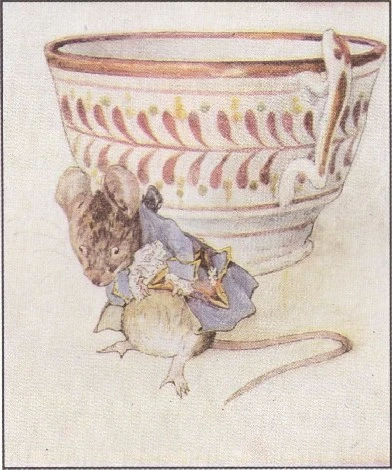
Out stepped a little gentleman mouse, and made a bow to the tailor!
And then from all over the dresser came a chorus of little tappings, all sounding together, and answering one another, like watch-beetles in an old worm-eaten window-shutter —
Tip tap, tip tap, tip tap tip!
And out from under tea-cups and from under bowls and basins, stepped other and more little mice who hopped away down off the dresser and under the wainscot.
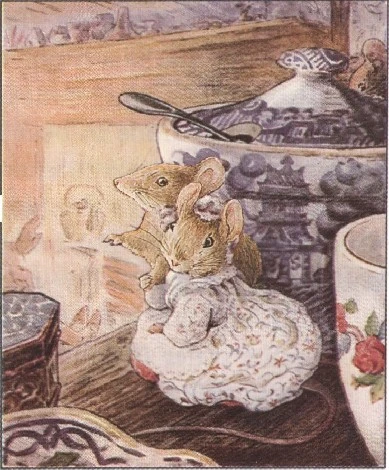
The tailor sat down, close over the fire, lamenting— “One-and-twenty button-holes of cherry-coloured silk! To be finished by noon of Saturday: and this is Tuesday evening. Was it right to let loose those mice, undoubtedly the property of Simpkin? Alack, I am undone, for I have no more twist!”
The little mice came out again, and listened to the tailor; they took notice of the pattern of that wonderful coat. They whispered to one another about the taffeta lining, and about little mouse tippets.
And then all at once they all ran away together down the passage behind the wainscot, squeaking and calling to one another, as they ran from house to house; and not one mouse was left in the tailor’s kitchen when Simpkin came back with the pipkin of milk!
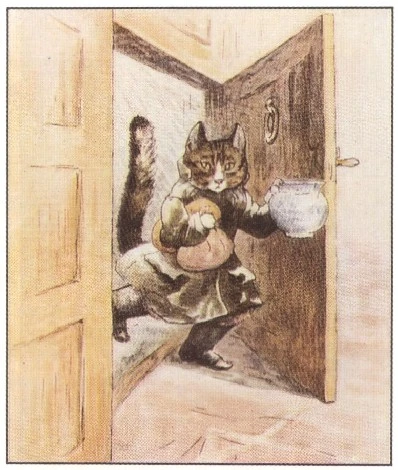
Simpkin opened the door and bounced in, with an angry “G-r-r-miaw!” like a cat that is vexed: for he hated the snow, and there was snow in his ears, and snow in his collar at the back of his neck. He put down the loaf and the sausages upon the dresser, and sniffed.
“Simpkin,” said the tailor, “where is my twist?”
But Simpkin set down the pipkin of milk upon the dresser, and looked suspiciously at the tea-cups. He wanted his supper of little fat mouse!
“Simpkin,” said the tailor, “where is my TWIST?”
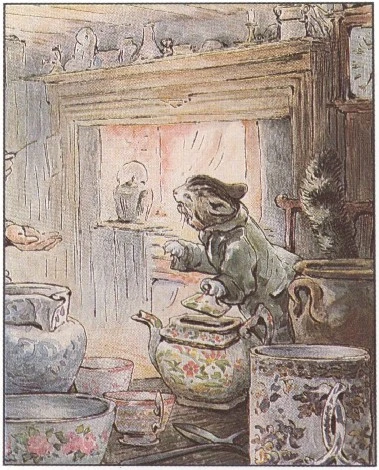
But Simpkin hid a little parcel privately in the tea-pot, and spit and growled at the tailor; and if Simpkin had been able to talk, he would have asked: “Where is my MOUSE?”
“Alack, I am undone!” said the Tailor of Gloucester, and went sadly to bed.
All that night long Simpkin hunted and searched through the kitchen, peeping into cupboards and under the wainscot, and into the tea-pot where he had hidden that twist; but still he found never a mouse!
Whenever the tailor muttered and talked in his sleep, Simpkin said “Miaw-ger-r-w-s-s-ch!” and made strange horrid noises, as cats do at night.
For the poor old tailor was very ill with a fever, tossing and turning in his four-post bed; and still in his dreams he mumbled— “No more twist! no more twist!”
All that day he was ill, and the next day, and the next; and what should become of the cherry-coloured coat? In the tailor’s shop in Westgate Street the embroidered silk and satin lay cut out upon the table — one-and-twenty button-holes — and who should come to sew them, when the window was barred, and the door was fast locked?
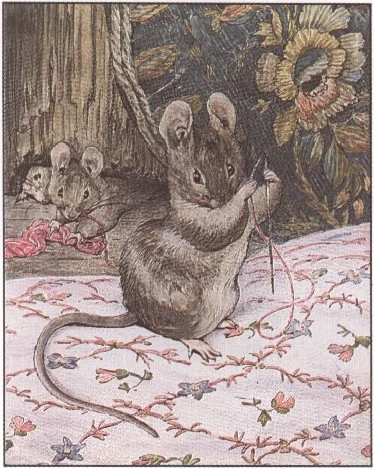
But that does not hinder the little brown mice; they run in and out without any keys through all the old houses in Gloucester!
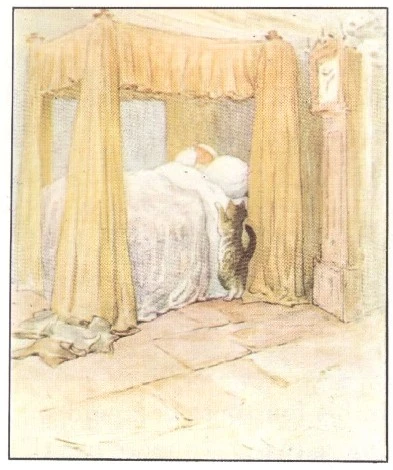
Out of doors the market folks went trudging through the snow to buy their geese and turkeys, and to bake their Christmas pies; but there would be no Christmas dinner for Simpkin and the poor old Tailor of Gloucester.
The tailor lay ill for three days and nights; and then it was Christmas Eve, and very late at night. The moon climbed up over the roofs and chimneys, and looked down over the gateway into College Court. There were no lights in the windows, nor any sound in the houses; all the city of Gloucester was fast asleep under the snow.
And still Simpkin wanted his mice, and he mewed as he stood beside the four-post bed.
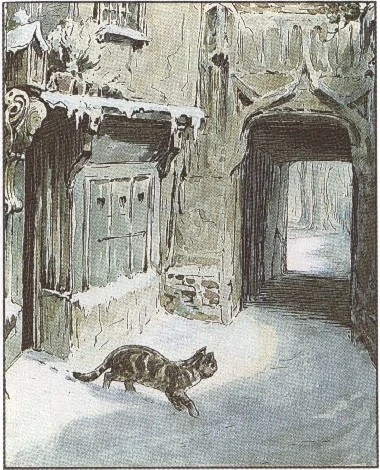
But it is in the old story that all the beasts can talk, in the night between Christmas Eve and Christmas Day in the morning (though there are very few folk that can hear them, or know what it is that they say).
When the Cathedral clock struck twelve there was an answer — like an echo of the chimes — and Simpkin heard it, and came out of the tailor’s door, and wandered about in the snow.
From all the roofs and gables and old wooden houses in Gloucester came a thousand merry voices singing the old Christmas rhymes — all the old songs that ever I heard of, and some that I don’t know, like Whittington’s bells.
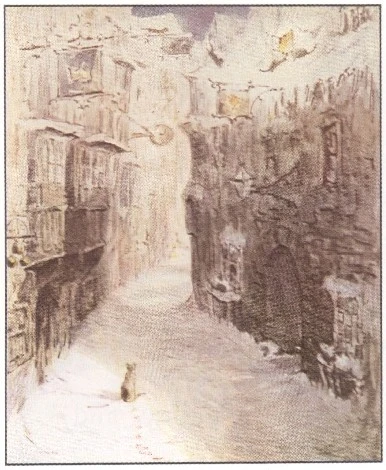
First and loudest the cocks cried out: “Dame, get up, and bake your pies!”
“Oh, dilly, dilly, dilly!” sighed Simpkin.
And now in a garret there were lights and sounds of dancing, and cats came from over the way.
“Hey, diddle, diddle, the cat and the fiddle! All the cats in Gloucester — except me,” said Simpkin.
Under the wooden eaves the starlings and sparrows sang of Christmas pies; the jack-daws woke up in the Cathedral tower; and although it was the middle of the night the throstles and robins sang; the air was quite full of little twittering tunes.
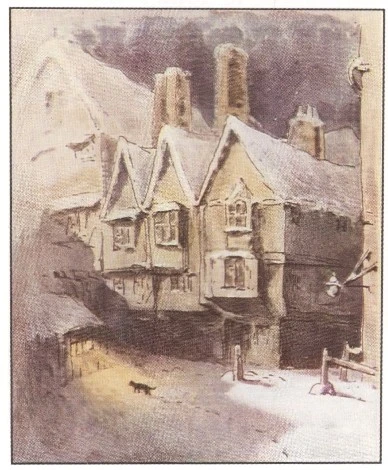
But it was all rather provoking to poor hungry Simpkin!
Particularly he was vexed with some little shrill voices from behind a wooden lattice. I think that they were bats, because they always have very small voices — especially in a black frost, when they talk in their sleep, like the Tailor of Gloucester.
They said something mysterious that sounded like —
“Buz, quoth the blue fly, hum, quoth the bee,
Buz and hum they cry, and so do we!”
and Simpkin went away shaking his ears as if he had a bee in his bonnet.
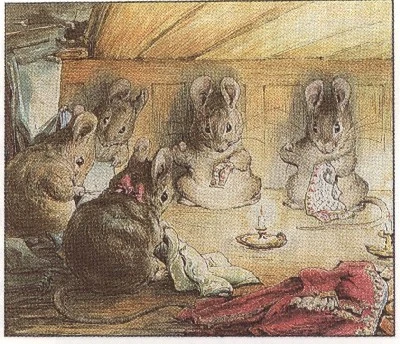
From the tailor’s shop in Westgate came a glow of light; and when Simpkin crept up to peep in at the window it was full of candles. There was a snippeting of scissors, and snappeting of thread; and little mouse voices sang loudly and gaily —
“Four-and-twenty tailors
Went to catch a snail,
The best man amongst them
Durst not touch her tail,
She put out her horns
Like a little kyloe cow,
Run, tailors, run! or she’ll have you all e’en now!”
Then without a pause the little mouse voices went on again —
“Sieve my lady’s oatmeal,
Grind my lady’s flour,
Put it in a chestnut,
Let it stand an hour — — “
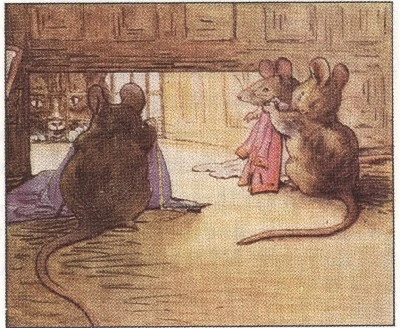
“Mew! Mew!” interrupted Simpkin, and he scratched at the door.
1 comment